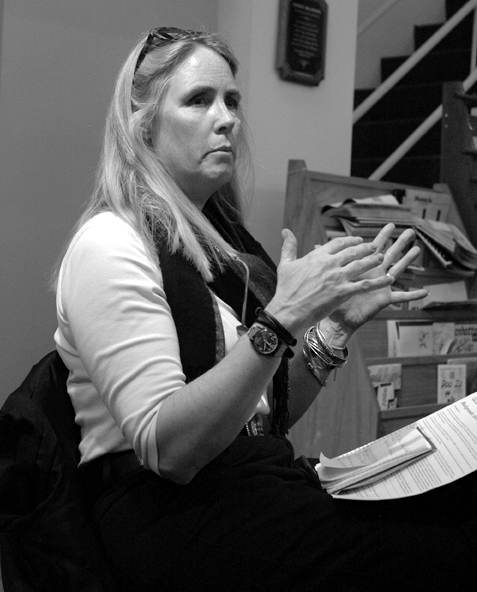Lecture: Alicia Shepard

Alicia Shepard. Photo: Laurel Angrist. © 2007 Laurel Angrist.
RELATED:
Alicia Shepard strolled into the fifth-floor atrium of NYU's journalism building, her cowboy boots and western belt clanking with every step. But the author and journalist was not as severe as her exterior implied. She came to NYU on April 11, 2007 to talk to students about what she called her baby: her recent book, Woodward and Bernstein: Life in the Shadow of Watergate (2006).
Shepard chose this topic for her second book because she believed that there was more to the Watergate scandal than governmental corruption. She wanted to explore the lives of Watergate's celebrity journalists, Bob Woodward and Carl Bernstein, in the aftermath of the story that shook the U.S. government.
Woodward and Bernstein is the product of surplus reporting from Shepard's September 2003 article, "Woodward and Bernstein Uncovered," published in The Washingtonian. The article, which Shepard described as "an oral history about 170 to 175 people whose lives had intersected with Woodward and Bernstein's," was 10,000 words long. Even at that hefty length, Shepard had heaps of leftover material. "So I thought, 'What about a book?'" she said.
Woodward and Bernstein offers a window into the intimate lives and personalities of, arguably, the most famous journalists of all time. "They created a super-reporter," Shepard said of the renowned reporting duo. "But they each had a very hard time afterward. What do you do after you break the story of the century?"
Woodward and Bernstein were "just polar opposites," Shepard said. Woodward's parents, both Republicans, raised him in the Midwest before he attended Yale University and then joined the navy. Bernstein, a college dropout, grew up in the Washington D.C. area, with Jewish parents who were members of the Communist party. Woodward was "very preppy, and Carl was very much a hippie," Shepard said. "But it gave them synergy."
Unlike Woodward and Bernstein's reporting on Watergate, today, Shepard said, media mishaps, such as radio host Don Imus's recent racist and sexist remarks about the Rutgers women's basketball team are highly publicized at first, but then usually fizzle out. These stories "bubble up and go away," she said, because the Internet's breaking news keeps reporters scrambling to chase down the next big story rather than spending time fleshing out older stories the way Woodward and Bernstein did with their Watergate reporting.
Shepard said she enjoys writing articles about interesting people like Woodward and Bernstein more than everyday news stories. "I've always thought that people are more interesting than issues in covering news," she said. "It's really about personalities."

